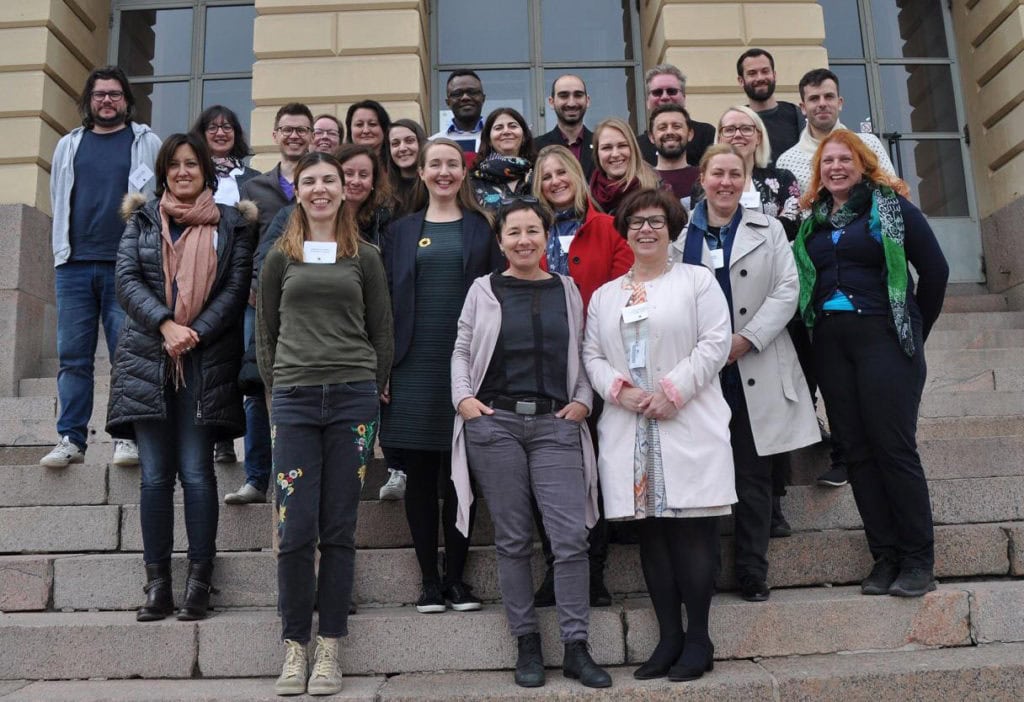ISEW at the University of Helsinki, with Kellogg staff member, Rodrigo Hernandez
In May of this year, Kellogg Academic Office Administrative Assistant Rodrigo Hernandez (back row, third from the right), attended an International Staff Exchange Week (ISEW) at the University of Helsinki. Here he shares with us his experience and what he learnt from his fellow delegates:

How did you find out about the International Staff Exchange Weeks?
I was looking for training opportunities beyond Oxford and found the Erasmus+ Staff Training in the University of Oxford website. The site provides information about eligibility and grants, plus a link to access an amazing staff training search tool. I was looking for training weeks focusing on networking, sharing good practices and, if possible, environmental sustainability.
The International Staff Exchange Week, organised by the University of Helsinki, proposed by far the best programme of events, seemed very professional and had a few years of experience managing exchange weeks.
What did you take away from the event that will be of use to you in your role at Kellogg?
The Oxford admission system is unique and it is hard to implement changes that may be useful somewhere else, however, thanks to comparing how different universities approach the same problems, we should be proud of how efficient our Academic Office is and how we can lead by example.
Regarding admissions, I realised that we are doing a great job, considering our incoming numbers, and was proud of the service we provide to our new students.
I had a productive meeting where I learnt about their Sustainability Master Class programme and introduced them to Green Impact (which is already expanding outside UK in Belgium and the Netherlands), explaining it is a great opportunity to expand their green policies to include academics, students and staff members of the University of Helsinki.
What did you find interesting about the way your fellow attendees or their institutions worked?
It was interesting to discover how other Universities use the economic income of their applicants as the main criteria for assigning Scholarships, while in Oxford we focus on their academic excellence. Perhaps a middle point should be found.
I was also interested in how a great programme of studies in one of the oldest Universities in Europe, KU Leuven in Belgium, was not appreciated by prospective candidates because they were seen as “cheap”, when actually, it was heavily subsidised. Because of this, prospective students assumed the quality did not meet the standards of other prestigious institutions, such as Oxford, where the course is more expensive. Staff from the University have to work hard to raise awareness and recruit candidates.
What do we do differently at Kellogg/Oxford that they found interesting and of use?
My colleagues appreciated how clear and helpful the website is for Graduate student applications. They also liked how students who are residents of a country listed by the World Bank as being low-income, are entitled to an application fee waiver (as long as they meet the entry requirements and would not otherwise be able to pay the fee).
They also liked how, here at Kellogg, we organise three weeks of events for new students to welcome and help them to integrate in our community, as well as our commitment to Green Impact as a team, and the fact staff and students worked together, with a common objective.
Did you get chance to socialise and/or experience much of Finnish life?
There were lots of opportunities to socialise and experience Finnish culture. Our first lunch was a meet and greet and we all ate dinner together that evening; everyone brought something from their country (and the Finns introduced us to Original/‘Lonkero’!)
On the second day we had a quick lesson in Finnish and a traditional Finnish dinner with plenty of yummy food, like reindeer and some kind of berries I have never seen before.
Wednesday was the best, because after a busy morning of roundtables and a focus on grants research, we had the afternoon off to explore! First, we went to Villa Kokkonen, which was designed by Alvar Aalto, where we ate and attended a small piano concert. From there we went to a hotel near the lake, where we played some traditional games, before going into the sauna. After a couple of hours in the sauna (drinking Original and Karhu – other Finnish drinks are available – to pluck up the courage) we went for a swim in the lake to cool down, then straight back to the sauna as the water was freezing! The day ended with a lovely barbecue in the hotel.
The last couple of days involved a visit to the beautiful Oodi Library and a delicious farewell lunch.
Would you recommend attending a similar event to your colleagues?
Definitely, it was an invaluable opportunity to meet colleagues working in different administration roles in Universities across Europe.
Attending an international training week is the best way to network, share knowledge and exchange ideas, learning positive and negative experiences from the different realities in the world of Higher Education.